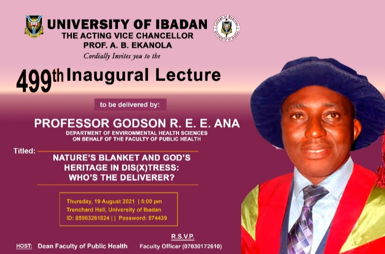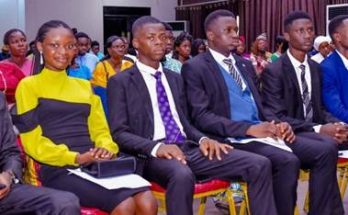Khadijah Kolapo
Professor Godson Ana, a professor of Environmental Health Sciences in the University of Ibadan has stressed the importance of educating children who are the most vulnerable to environmental health issues about the environment from a tender age.
He said this while delivering the 499th inaugural lecture titled: “Nature’s blanket and God’s heritage in Dis(x)tress. Who’s the deliverer?” on Thursday, 20th of August at Trenchard hall.
According to him, children’s immature immune system, involvement in vigorous activities and increased length of time spent outdoors makes them more likely to be affected adversely by air pollution issues which predisposes them to different kinds of health conditions – infectious or not. Exposure of mothers to air pollution during conception may also put them at risk of premature births and birth defects. He cited a study which links exposure to air pollution with child mortality.
“There is a dire need for a mass of well trained and nurtured people who will not only have passion for environmentally related issues but also demonstrate strong commitment addressing the problems at the community level,” he explained. He also pointed at the high impressionability of and the ease of habit building in children.
Professor Ana, the dean of the faculty of Public Health, stated that for an improvement in environmental health, it is required that parents teach their children basic home management and physical environmental care skills, environmental health education should be integrated into the school curriculum at all levels and that the government should focus more on preventive measures as regards environmental problems rather than remedial ones.
While lamenting on the high level of distress of the natural ecosystem indicated by the disparity between the measure of several environmental health factors and the permissible quantity as evidenced in several studies he was involved in, he listed some of the contributions he has made to reduce air pollution effects. They include the creation of biofuels – biogas, biodiesel (patented) and bioethanol – from non-edible plant-based and waste biomass materials and tree planting in heritage park while serving in some organizations.
He recommended that there be aggressive campaign and reorientation on changing attitudes and value systems in relation to the environment and that the government establish air monitoring stations in all Ecological zones of the country.




